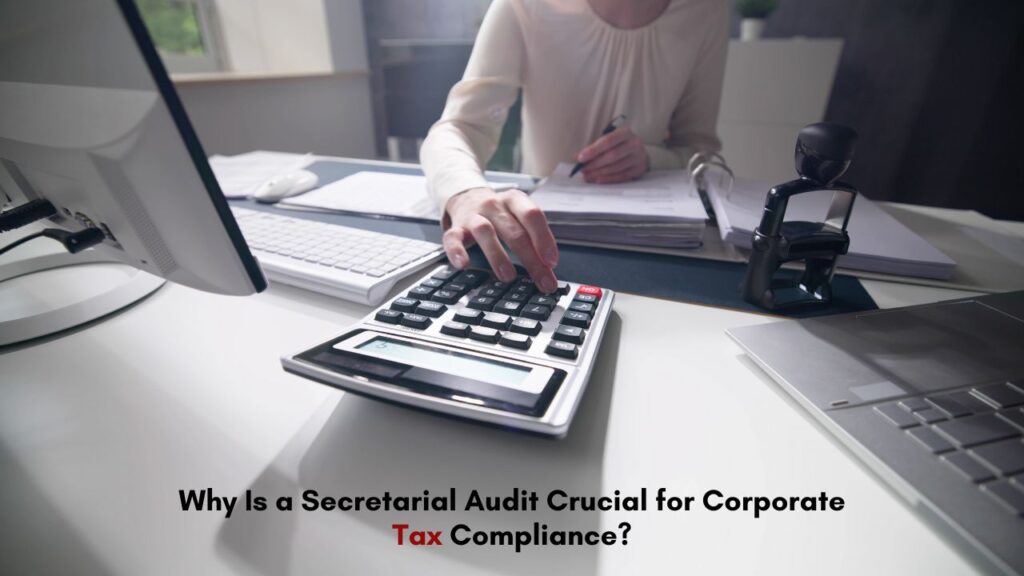Introduction
Corporate tax compliance is a cornerstone of sustainable business operations. It ensures adherence to tax laws, minimizes risks, and fosters trust with stakeholders. Among the many practices that support tax compliance, the role of a secretarial audit is often overlooked but highly significant. It aligns governance, regulatory adherence, and taxation seamlessly, making it indispensable for corporate entities.
Understanding Secretarial Audit
A secretarial audit is a comprehensive evaluation of a company’s compliance with statutory and regulatory requirements. It also assesses the adherence to good governance practices. Conducted by qualified company secretaries, this audit ensures that companies maintain transparency, mitigate risks, and fulfill their corporate responsibilities effectively.
For tax compliance, secretarial audits play a dual role. First, they identify gaps in regulatory adherence, which can lead to tax penalties. Second, they provide insights into improving financial and administrative systems, aiding in seamless tax compliance.
Benefits of Secretarial Audit for Corporate Tax Compliance
The benefits of secretarial audit extend far beyond meeting legal obligations. It ensures:
- Proactive Compliance: Secretarial audits highlight potential non-compliance areas, allowing companies to address them proactively before they result in fines or litigation.
- Accurate Documentation: Maintaining accurate records is essential for tax filings. A secretarial audit ensures that documents required for tax audits are up-to-date and accurate.
- Risk Mitigation: It identifies discrepancies in financial and operational processes that could lead to tax liabilities.
- Stakeholder Confidence: A clean audit enhances a company’s credibility with investors, regulators, and the public.
By embedding secretarial audits into the corporate framework, companies can streamline their tax compliance efforts and avoid costly penalties.
The Role of Due Diligence in Secretarial Audit
Due diligence is another critical aspect of corporate tax compliance. It involves a detailed assessment of the company’s financial, legal, and operational records to ensure they align with statutory requirements.
Due diligence preparation for a secretarial audit involves:
- Reviewing Legal Documents: Checking that board resolutions, contracts, and agreements comply with laws and regulations.
- Evaluating Financial Records: Ensuring the accuracy and completeness of financial statements for seamless tax filings.
- Assessing Operational Compliance: Verifying that operational practices align with statutory and tax laws.
When secretarial audits incorporate robust due diligence, they not only ensure compliance but also lay the foundation for improved tax practices.
The Connection Between Tax Audit and Secretarial Audit
A tax audit examines a company’s tax returns and financial records to verify compliance with tax laws. While tax audits focus on fiscal accuracy, secretarial audits address the broader regulatory and governance framework. Together, they ensure holistic compliance.
Documents required for tax audit often overlap with those examined during a secretarial audit, including:
- Financial statements
- Tax filings
- Board resolutions
- Statutory registers
- Compliance certificates
By streamlining processes and ensuring proper documentation, secretarial audits reduce the likelihood of errors in tax audits. This synergy helps companies meet their obligations efficiently.
Leveraging Virtual CFO Services for Effective Audits
For many companies, especially small and medium enterprises (SMEs), managing secretarial and tax audits internally can be resource-intensive. This is where Virtual CFO Services come into play.
Virtual CFOs, or outsourced CFO services, provide expert financial guidance without the overhead costs of hiring full-time staff. They offer:
- Expert Oversight: Virtual CFOs ensure that audits are aligned with best practices, reducing compliance risks.
- Cost Efficiency: By outsourcing financial management, businesses can access top-tier expertise at a fraction of the cost.
- Streamlined Processes: Virtual CFOs integrate secretarial audits with other financial processes, ensuring seamless compliance.
For companies navigating complex tax and regulatory landscapes, outsourced CFO services are invaluable. They help bridge gaps, enhance compliance, and optimize tax strategies.
Steps to Maximize the Impact of Secretarial Audits
To ensure that secretarial audits contribute effectively to corporate tax compliance, companies should focus on the following:
- Comprehensive Planning: Map out all compliance requirements and align them with audit objectives.
- Effective Collaboration: Engage with company secretaries, auditors, and Virtual CFOs to ensure all aspects of compliance are covered.
- Timely Execution: Conduct audits well in advance of tax deadlines to address potential issues proactively.
- Continuous Improvement: Use audit findings to enhance governance and compliance frameworks.
Conclusion
A secretarial audit is more than a regulatory requirement; it is a strategic tool for ensuring corporate tax compliance. By integrating due diligence, aligning with tax audits, and leveraging
Virtual CFO Services, companies can navigate the complexities of compliance with confidence.
Embracing the benefits of secretarial audits not only safeguards against penalties but also strengthens a company’s reputation and operational efficiency. In today’s stringent regulatory environment, this makes secretarial audits a cornerstone of corporate success.
Tax Implications of Resolving a RERA Complaint





